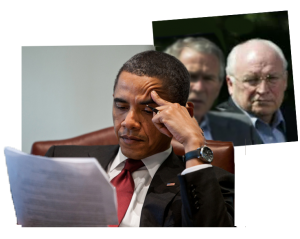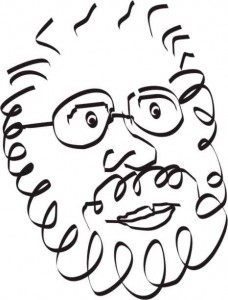 Over at the Washington Post David Ignatius, has a great essay on Obama’s political faults vs. Obama’s management style. I agree with Ignatius on most of this but suggest that the word “covert” is misplaced.
Over at the Washington Post David Ignatius, has a great essay on Obama’s political faults vs. Obama’s management style. I agree with Ignatius on most of this but suggest that the word “covert” is misplaced.
Dick Chaney was a covert commander in chief. Barack Obama is more simply a decision maker. He does this openly and very well. Obama’s achievements in remaking American foreign policy and even in guiding us through the Great Recession are amazing. There is nothing covert about this President. 
The difference between Chaney and Obama is like the comparison of Eisenhower vs. Patton, except that Patton was never the commander in chief. Patton was VERY vivible, He was a better leader than Ike, a mere administrator rather than a Caesar leading hius troops. Fortunately for us all, Ike make the decsions.
I feel the same way about Obama. We have a great man making decisions, however unlike IKE, Obama can not just tell the troops what to do. Many of his decisions need to be explained to a Patton-like , egotistical camp of Luddite generals .. today’s Republican party. Over riding trhe Patton camp without the authority Ike had in Europe, can only be done by selling Obama’s ideas to the public.
Perhaps we need a Reagan with Obama’s intellect, a much more effective communicator. Biden can not do tis. He should move into the cabinet and Barack should run with Hillary.
Excerpts from Ignatius’ column:

Intelligence is certainly an area where the president appears confident and bold. James Clapper, the director of national intelligence who has been running spy agencies for more than 20 years, regards Obama as “a phenomenal user and understander of intelligence.” When Clapper briefs the president each morning, he brings along extra material to feed the president’s hunger for information.
This is a president, too, who prizes his authority to conduct covert action. Clapper’s predecessor, Adm. Dennis Blair, lost favor in part because he sought to interpose himself in the chain of covert action. That encroached on Obama, who aides say sees it as a unique partnership with the CIA.
Another sign of Obama’s penchant for the secret world was his decision to hire David Petraeus as CIA director. The president appears to be ratcheting up intelligence and paramilitary operations under the leadership of the nation’s most celebrated military commander, even as he withdraws uniformed troops from Iraq and Afghanistan.
Bob Woodward, in “Obama’s Wars,” describes how the president-elect was told the nation’s most sensitive secrets on Nov. 6, 2008, two days after the election. “I’m inheriting a world that could blow up any minute in half a dozen ways,” he told an aide later. Obama immediately began to master the tools of counterterrorism.
The primacy of intelligence was clearest in the Abbottabad raid. Thom Shanker and Eric Schmitt of the New York Times describe in their new book, “Counterstrike,” how Obama was presented on April 28 with three choices — the helicopter assault on the compound, a safer Predator attack or waiting for more intelligence to verify bin Laden’s presence. After deliberating for 16 hours, Obama chose the first, and riskiest, option.
Perhaps Obama’s comfort level with his intelligence role helps explain why he has done other parts of the job less well. He likes making decisions in private, where he has the undiluted authority of the commander in chief. He likes information, as raw and pertinent as possible, and he gets impatient listening to windy political debates. He likes action, especially when he doesn’t leave fingerprints.
What this president dislikes — and does poorly — is political bargaining. He’s as bad a dealmaker as, let’s say, George Smiley would be. If the rote political parts of his job sometimes seem uninteresting to him, maybe that’s because they seem trivial compared to the secret activities that he directs each morning. If only economic policy could be executed as coolly and cleanly as a Predator shot.
….
On this anniversary of Sept. 11, 2001, America is lucky to have a president who is adept at intelligence. But it needs, as well, a leader who can take the country out of the shadows and into the light.